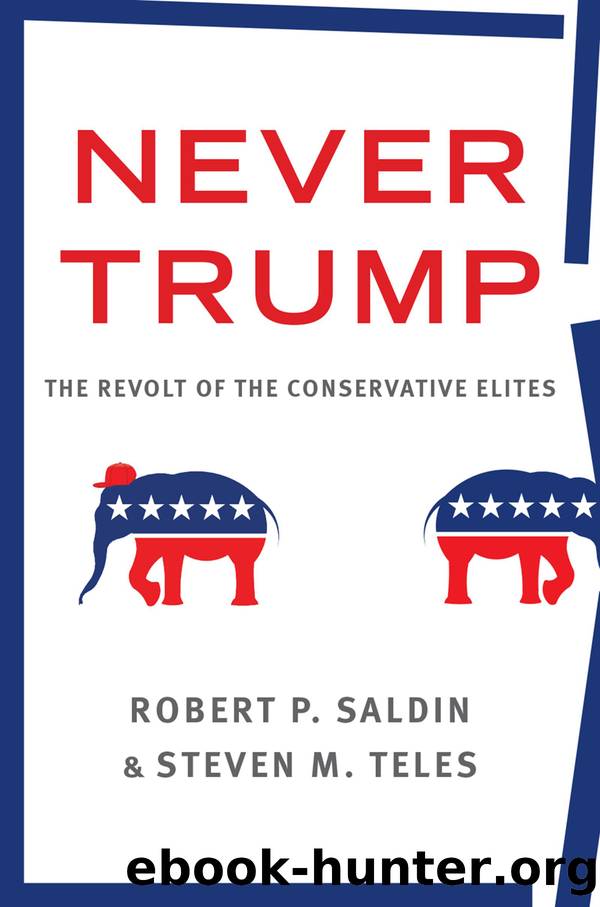Never Trump by Robert P. Saldin

Author:Robert P. Saldin
Language: eng
Format: epub
Publisher: Oxford University Press
Published: 2020-06-15T00:00:00+00:00
The Business Model of Conservatism
The practice of gatekeeping is ideological work, but it depends upon specific material conditions to be effective. Conservatism is a set of ideas, but for thousands of people it is also the way they pay their bills. As James Q. Wilson argued in Political Organizations,14 the behavior of even highly ideologically motivated actors is shaped in fundamental ways by how they acquire resources and mobilize employees and supporters. Wilson had in mind nonprofit organizations, but critically for our purposes the landscape of conservatism is now populated to a significant degree by actual profit-making businesses, for whom conservatism is a product with considerable market value. Within this organizational world, conservatives are divided by modes of political action that interact in complicated ways with how they acquire resources, and by different relationships to liberalism and mainstream institutions. Notably, the opponents of Trump were not randomly distributed across the different ways that conservatives make a career of conservatism, and many took the rise of Trump as a signal that their business model was losing out to another—and in their minds, worse—alternative.
Roughly speaking, one strain of conservatism prizes intellectualism, refinement, and “respectability.” This strain of conservative public intellectuals seeks to operate within or at least alongside generally liberal institutions, seeks to persuade liberals that conservatism is a decent, civilized set of ideas, and seeks to compete with it in part by claiming that conservative ideas are better able to achieve liberal ends (including advancing women, minorities, and the poor) than are liberal ideas.15 This style of conservatism is consciously bookish, identified more with particular texts and ideas rather than a tribal identity.16 It presents itself as holding liberal institutions to their own standards and beating liberals at their own game. Conservatives in this world take the distinction between different brands of conservatism exceptionally seriously, and argue with themselves about the relative merits of different philosophical schools—libertarianism, social conservatism, Burkeanism—as much as they devote themselves to a critique of liberalism. For these conservatives, respectability is valued in itself and because it is necessary in order for their ideas to be taken seriously outside of the world of conservatism.
Organizationally, conservatives who adopt this presentation of self are much more likely to be found in universities or think tanks and to have their bylines appear, at least part of the time, in mainstream outlets generally run by liberals, such as the New York Times or The Atlantic. Many of these conservatives draw resources and exposure from mainstream outlets that embrace norms of fair play, or that simply have a desire to reach a larger audience by making space for conservative voices. In other cases, they operate within right-of-center nonprofit institutions supported by conservative donors who themselves care about respectability. Finally, many of these conservatives are in professions like the law or academia that make them insider-outsiders—people who disagree with some of their profession’s key ideas, but accept the need for elite professions and the imperative to operate within them. Never Trump draws very heavily on this kind of conservatism.
Download
This site does not store any files on its server. We only index and link to content provided by other sites. Please contact the content providers to delete copyright contents if any and email us, we'll remove relevant links or contents immediately.
The Secret History by Donna Tartt(19083)
The Social Justice Warrior Handbook by Lisa De Pasquale(12190)
Thirteen Reasons Why by Jay Asher(8907)
This Is How You Lose Her by Junot Diaz(6885)
Weapons of Math Destruction by Cathy O'Neil(6279)
Zero to One by Peter Thiel(5798)
Beartown by Fredrik Backman(5751)
The Myth of the Strong Leader by Archie Brown(5507)
The Fire Next Time by James Baldwin(5440)
How Democracies Die by Steven Levitsky & Daniel Ziblatt(5218)
Promise Me, Dad by Joe Biden(5153)
Stone's Rules by Roger Stone(5087)
A Higher Loyalty: Truth, Lies, and Leadership by James Comey(4959)
100 Deadly Skills by Clint Emerson(4924)
Rise and Kill First by Ronen Bergman(4788)
Secrecy World by Jake Bernstein(4751)
The David Icke Guide to the Global Conspiracy (and how to end it) by David Icke(4717)
The Farm by Tom Rob Smith(4506)
The Doomsday Machine by Daniel Ellsberg(4489)
